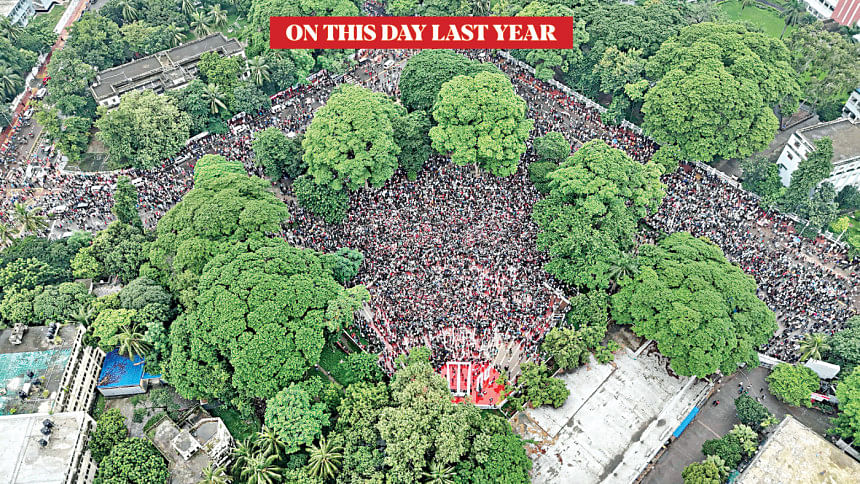August 03, 2024: A nation united under one demand

On August 3, 2024, the anti-discrimination movement in Bangladesh reached a new peak as protesters rejected prime minister Sheikh Hasina's offer for dialogue and instead placed a singular, uncompromising demand before the nation: the resignation of the prime minister and her entire cabinet.
What began as a decentralised uprising led by students evolved into a mass mobilisation, pulling together people from all segments of society in a powerful demonstration of unity and defiance.
From early morning, thousands began converging on the Central Shaheed Minar in Dhaka, many of them braving rain with family members, waving national flags, and holding placards bearing the faces of the dead, the disappeared, and slogans of resistance. The surrounding areas, Doyel Chattar, Jagannath Hall, Dhaka Medical College Hospital, and Shibbari intersection, overflowed with protesters as chants of "Dofa Ek, Dabi Ek: Sheikh Hasinar Podotyag" echoed through the streets. The rally, which formally began at 5:00pm, soon swelled to tens of thousands, bringing together teachers, lawyers, garment workers, parents, rickshaw pullers, and children.
In the midst of this crowd, Nahid Islam, a key organiser of the Anti-Discrimination Student Movement, took the stage and declared, "We are here with a one-point demand. We seek to ensure people's safety and justice."
The protest sites extended far beyond the boundaries of the Shaheed Minar.
In Mirpur-10, thousands of students and citizens blocked the roundabout. In Uttara, students and parents stood shoulder to shoulder near BNS Centre, carrying placards like "My brother is in the grave, why is the killer outside?" and "Police, whose side are you on?"
Meanwhile, Dhaka College students blocked Mirpur Road at Science Lab, vowing to stay until the one-point demand was fulfilled. The day's procession was peaceful in the capital, with security forces largely maintaining distance.
However, clashes erupted in at least seven districts, including Gazipur, Chattogram, Cumilla, Sylhet, Bogura, Jamalpur, and Faridpur, where police and ruling party activists allegedly opened fire on demonstrators. Two people were killed, and at least 55 others were injured.
Earlier that morning, Sheikh Hasina addressed members of the Professionals' Coordination Council at Gono Bhaban, stating, "The Gono Bhaban's doors are open. I want to sit with the agitating students and listen to them. I don't want any conflict."
She called for the release of detained students and pledged that trials would be held for each person killed in the protests. But her appeal fell flat. Organisers and demonstrators alike viewed the gesture as too little, too late.
Adding to the momentum, the Students Against Discrimination released a 15-point directive to enforce the non-cooperation movement.
These included calls to halt tax and utility bill payments, shut down educational institutions, courts, mills, and factories, and boycott all state-run seminars, events, and institutions.
They also called for suspending remittances through formal banking channels, offshore transactions, and transport services, while making exceptions for hospitals, emergency services, and daily essentials. The movement sought full nationwide shutdowns without economic collapse by allowing workers to claim salaries while refusing cooperation with the state.
In response to the growing tension, Army Chief General Waker-Uz-Zaman issued a directive to ensure the protection of lives, property, and vital state institutions. He emphasised that the Bangladesh Army had always stood by the people and would continue to do so in times of need.
Meanwhile, BNP Secretary General Mirza Fakhrul Islam Alamgir released a statement demanding the government step down without further bloodshed.

 For all latest news, follow The Daily Star's Google News channel.
For all latest news, follow The Daily Star's Google News channel. 



Comments